MTV Turns 25 And How Are They Celebrating? By Seeking More and More Digital Growth
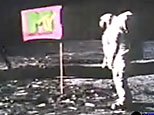 On Tuesday, August 1st, MTV celebrates its 25th birthday. Everyone knows the first video that was broadcast: "Video Killed The Radio Star" by the Buggles. But what was the second video? "You Better Run" by Pat Benatar.
On Tuesday, August 1st, MTV celebrates its 25th birthday. Everyone knows the first video that was broadcast: "Video Killed The Radio Star" by the Buggles. But what was the second video? "You Better Run" by Pat Benatar.
Those were the days introducing us to the VJ and a limited inventory of back-to-back music videos with the occassional in-studio artist drop-in and promos proclaiming "I Want My MTV". That MTV revolutionized the music business and helped all: music labels, radio stations, promoters, cable operators, advertisers targeting the leading-edge youth market and concert venue operators. And, of course, the bands and artists that made the leap to music videos. Music was no longer just in your ears, it was in your face. It reinvigorated a business needing a new platform...and MTV provided it.
If you were a high school teen, you wanted your MTV. Even better was "watching" it with your girlfriend. Now that's a memory... 25 years later, that MTV of old is only a nostalgic memory. It was bold at the time but looks quaint in retrospect, filled with mullets and zebra-stripped clothes.
25 years later, that MTV of old is only a nostalgic memory. It was bold at the time but looks quaint in retrospect, filled with mullets and zebra-stripped clothes.
From Bananarama to Bon Jovi to Beavis to Britney, there have been a lot of highs and lows for MTV.
Nowadays, MTVN has a whole new mission: "You have to evolve or die", says MTV Networks chairman and CEO Judy McGrath -- named one of the most important execs by Fortune magazine. And digital media is reinvigorating the music business once again...with MTV clearly planning to be an active participant.
Instead of just lauding its accomplishments over 25 years, MTV actually is being pretty low-key about its birthday. Sure, they are "re-creating" the original MTV over on VH1 Classic all day and Sirius Satellite Radio will offer a two-hour retrospective from most of the original VJs. MTV with make a few mentions throughout the day. Otherwise, it's business as usual. And why not? Most of its current audience wasn't born 25 years ago and that MTV was a very different one that what they see now.
Last week, Ms. McGrath made a keynote speech at the Cable & Telecommunications Association for Marketing (CTAM) conference in Boston, showing an old commercial of a roller skater carrying a TV on her shoulder, jokingly touting "MTV to go."
As reported by MultiChannel News:"I can't believe we actually did that promo," said McGrath. "But we figured back then if they could, people would want to take their MTV with them. So now they can, with all the new platforms."
So what does MTVN plan next? McGrath said the debut of new broadband channels aimed at baby boomers would be launched, led by former VH1 president and current MTVN president of network development John Sykes as new-form dual online/cable channels.
McGrath spoke about the "everywhere" world philosophy enveloping Viacom Inc.'s MTVN, which has been reorganized to place digital content alongside linear TV production.
The impetus: Consumers are seeking media on an array of platforms and will follow good content across different platforms.
"New technology has inspired new consumer behavior, unleashing pent-up demand...You have to evolve or die. Those are the stakes," she said, noting that cable operators are playing a key role in giving users access to this universe with their high-speed products.
McGrath said that from March to April there was a 40% increase in the number of streams against MTVN's various broadband sites.
She also pointed to a change in social behavior, saying in the past that when a parent sent a kid to his or her room it was a punishment: "Now, it's the center of a personal ecosystem."
Therein, McGrath said young people are engaged in digital doings to the extent that 57% create daily content for the Internet, either through text, pictures or video; they spend up to three hours a day on the Web; nine out of 10 use the Web to help them with homework; and two-thirds of them send e-mail messages constantly. She also noted that the number of cell phone users ages 8 to 11 has doubled.
McGrath said that migration of media is also important to advertisers. "Today, consumers are not targeted, but hunted and snared, individually and collectively" she said, adding that MTVN's far-reaching advertising deal with OMD, included components touching such properties as iFilm, NeoPets, XFire, Motherload and MTV Uber.
McGrath, in response to BusinessWeek senior editor Tom Lowry's question during an on-stage interview, cited user-generated video and YouTube as the media business' biggest game-changers of the past six months." The hunt for more digital transference continues. With rarely a music video or mullet to be seen.
The hunt for more digital transference continues. With rarely a music video or mullet to be seen.
Happy 25th Birthday, MTV.
posted by Unknown @ Monday, July 31, 2006,
,
![]()
![]()
When Radio Formats Change
 The Internet is the afterlife heaven when your favorite radio station changes formats, from old Stern broadcasts to just about any viral audio classic, if you look hard enough. Especially on peer2peer places like Limewire and BitTorrent.
The Internet is the afterlife heaven when your favorite radio station changes formats, from old Stern broadcasts to just about any viral audio classic, if you look hard enough. Especially on peer2peer places like Limewire and BitTorrent.
I still remember the great radio stations I listened to in my childhood, no matter where I lived or travelled. To me, WLS doesn't mean Talk Radio, it hearing the jingle "89 double u ELLLLL ess, Chicago" with Larry Lujack, Little Tommy, the Animal Stories, John "Records" Landecker and all the rest of the superjocks. Or over at Super CFL. Or The Loop. Or listening to Cubs broadcasts on WGN mixed in with weird farming reports.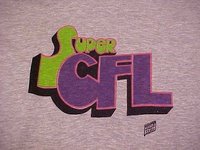 Over the years, there were dozens of stations that influenced me before I began working in radio more than 20 years ago. I was simply a fan. Sadly, some of those stations changed formats, leaving that station's audience scrambling to find a replacement if they didn't like what they now heard.
Over the years, there were dozens of stations that influenced me before I began working in radio more than 20 years ago. I was simply a fan. Sadly, some of those stations changed formats, leaving that station's audience scrambling to find a replacement if they didn't like what they now heard.
In radio, formats change all the time across the country. While it is complicated enough on the business end to change products, often the old brands "live on" inside the memories of radio listeners. This sometimes makes it complicated for listeners to embrace the new formats.
In New York City recently, Free FM replaced the 20-year old K-Rock format; Jack replaced legendary station WCBS, which had started playing its "oldies" when they were first brand new hits in the '60s; and, over at WNEW, Hot Talk first replaced its 30-year Rock format, followed by a "Mix" AC format. None have earned better ratings than the format they replaced.
Some format changes, though, have succeeded in New York. Over at 105.1FM, it was forever a "dog" frequency, never attracting large audience. Most of the 90s saw it as a weak "Mix" or "Soft Rock" station. Then, with new owners, it tried Pop Alternative "Big 105" followed by R&B/Disco "Jammin' Oldies". More failure. It wasn't until it changed to Hip Hop/Contemporary R&B Power 105 that it found an audience, putting the station neck-and-neck for Hip Hop leadership.
For 9 years, WYNY failed to generate substantial ratings as NYC's only country station. When it surprised the market by changing to Disco WKTU in 1996, it went from dud to stud, earning the #1 rated prize in its first book.
Over time, radio stations sometimes change format, hoping to attract a larger new audience. But often, the old favorite station isn't forgetten. We hold onto the songs we loved and the DJs that made us laugh and the special moments they shared in out lives. We'll have to wait and see in the years to come how memorable recent format changes -- in New York and all other markets -- actually will be.
Thanks to the Internet, there are now places to actually relive beofre formats changed, where other radio fans have archived audioclips of the old stations and the first moments launching the new formats. One example I recommend is FormatChange.com, run by the Airchexx.com site. They list the history of many different markets.
There are a number of excellent historical aircheck sites and local radio message web forum boards where you can stream old broadcasts, such as RadioTimeline.com, which covers Chicago, New York and Los Angeles very well. It also has a long list of individual radio stations and personalities from across the country and in Canada. If you have any other sites to recommend, just add your comment here. We encourage you to contribute to the archive sites, too, if you happen to have any old broadcasts ready to share.
Just might bring back some memories of your own.
For the CBC broadcast archives here
posted by Unknown @ Sunday, July 30, 2006,
,
![]()
![]()
CBS Corp: First Move To Counter FCC Indecency Movement
 Time to go to court! Let's see CourtTV cover this one. At least better than the actual "wardrobe malfunction" in question: the infamous Janet Jackson incident during the 2004 Super Bowl halftime show, drawing a $550,000 fine against CBS Corporation.
Time to go to court! Let's see CourtTV cover this one. At least better than the actual "wardrobe malfunction" in question: the infamous Janet Jackson incident during the 2004 Super Bowl halftime show, drawing a $550,000 fine against CBS Corporation.
CBS announced today it is appealing. So it's CBS v. FCC...game on!
For the first time since the passing of the Telecom Bill of 1996, which opened the doors for media companies to dramatically expand their ownership limits and created a massive merger & acquisition phase among broadcasters, broadcast companies may be ready to stand up against the FCC's indecency movement. In order to grow these last 10 years, radio and TV companies have heavily paid the costs of being allowed to be bigger: big fines issued by the FCC whenever programming is labeled "indecent".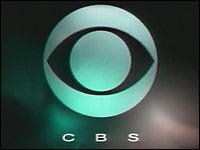 Now CBS is ready to take the FCC to court. Fine penalities recently increased ten-fold were passed by Congress. Perhaps enough is enough. Perhaps the open risk of vague rule breaking just got too expensive to be allowed to continue. Perhaps media is ready to defend one of its principle assets: the broadcast of free speech.
Now CBS is ready to take the FCC to court. Fine penalities recently increased ten-fold were passed by Congress. Perhaps enough is enough. Perhaps the open risk of vague rule breaking just got too expensive to be allowed to continue. Perhaps media is ready to defend one of its principle assets: the broadcast of free speech.
The largest radio companies -- CBS Radio (formerly Infinity Broadcasting up until December 2005) and Clear Channel -- have absorbed the most fines due to their star talent. While Howard Stern was with Infinity, the "King of All Media" racked up several million dollars in fines for his nationally-broadcast show. Clear Channel received them, too -- for Stern as well as for Bubba the Love Sponge and others. As did other companies. Most companies appealed to the FCC; however, their efforts might be categorized as "less than vigorous" for one simple fact: no radio company wanted to impede its ability to acquire more stations, which the FCC could stall and essentially prevent. In addition, more importantly, no company wanted to jeopardize their own broadcast license, either. Nor have further restrictions placed on their multi-media holdings (such as cable TV networks).
Most companies appealed to the FCC; however, their efforts might be categorized as "less than vigorous" for one simple fact: no radio company wanted to impede its ability to acquire more stations, which the FCC could stall and essentially prevent. In addition, more importantly, no company wanted to jeopardize their own broadcast license, either. Nor have further restrictions placed on their multi-media holdings (such as cable TV networks).
So, in effect, if radio wanted to continue to expand its holdings, by de facto, it had to kowtow to the Republican-led congressional FCC's agenda protecting "community values" over the public airwaves. Appeals were rejected and the fines, while not preferred by broadcasters, were paid. To prevent further fines, aggressive broadcast delay buttons were installed, broadcasts heavily monitored and edited for instant dumping of questionable material...and, ultimately, the more "extreme" or "outrageous" examples of programming were dropped or faded away.
Radio had to retreat from one of its leading edges.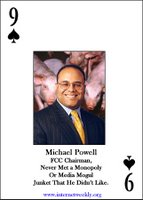 The most noticed observation as radio companies became safer major public corporations listed on Wall Street was that radio chose NOT to make this a "free speech" issue, to NOT take it to the Supreme Court, to NOT force a change in law to remove the ambiguities defining "indecency" and, what appeared to many media watchers, the apparently inconsistent manner the FCC made its decisions, especially under the guidance of former Commissioner Michael (son of Colin) Powell.
The most noticed observation as radio companies became safer major public corporations listed on Wall Street was that radio chose NOT to make this a "free speech" issue, to NOT take it to the Supreme Court, to NOT force a change in law to remove the ambiguities defining "indecency" and, what appeared to many media watchers, the apparently inconsistent manner the FCC made its decisions, especially under the guidance of former Commissioner Michael (son of Colin) Powell.
It gave the appearance that the FCC (whose members are appointed, not elected) had a political agenda spearheaded by the Republican Congress and Republican White House...instead of following its non-partisan, unbiased mandate, as was defined when the Commission was originally created.
So radio took its lumps, neutered its programming to fit political and corporate interests...and accepted it as the cost of doing business, even if it meant removing highly-profitable shows and talent.
At the same time, radio shows others considered offensive -- such as the neo-conservative hate rantings from Rush Limbaugh, G. Gordon Liddy and others -- stayed clean of fines. Apparently, being offensive really wasn't offensive if it supported the government's talking points. The entire broadcast indecency movement hit its crazed pinnacle, however, not because of radio. Blame TV for that. It was the 2004 Janet Jackson Super Bowl halftime incident, broadcast on the CBS TV network. For .56 of a second, Janet had her open right breast and jewelry-shielded nipple exposed after Justin Timberlake ripped off her bodice, right before the lights went out. Viewers at home saw an act in a blink, not the actual breast or nipple. If they wanted that, all they had to do was go to the Internet, where the Drudge Report (and many other conversative-leaning websites) posted video clips and stills of the "indecent" act. And this was before YouTube and Google Video (which, of course, keep it in their active archives). For that .56 of a second broadcast across America and the world, the CBS TV network got fined a whopping $550,000.
The entire broadcast indecency movement hit its crazed pinnacle, however, not because of radio. Blame TV for that. It was the 2004 Janet Jackson Super Bowl halftime incident, broadcast on the CBS TV network. For .56 of a second, Janet had her open right breast and jewelry-shielded nipple exposed after Justin Timberlake ripped off her bodice, right before the lights went out. Viewers at home saw an act in a blink, not the actual breast or nipple. If they wanted that, all they had to do was go to the Internet, where the Drudge Report (and many other conversative-leaning websites) posted video clips and stills of the "indecent" act. And this was before YouTube and Google Video (which, of course, keep it in their active archives). For that .56 of a second broadcast across America and the world, the CBS TV network got fined a whopping $550,000.
CBS had appealed its radio fines and, ultimately, paid them. CBS tried to play nice (they even outraged some in the black community for their lack of defense for Ms. Jackson). CBS appealed this TV fine, too...but remains resolute in not paying it. For the first time post-Telecom, a media company is taking its case to the Courts and not just the FCC. Today, CBS announced it is actually taking the FCC to court over the $550,000 nipplegate fine, announcing that it is filing an appeal today (7/28) in the Third Circuit Court of Appeals and has paid the fine only for procedural reasons to allow the appeal. It fully intends on winning and getting its money back. It might mean going all the way to the Supreme Court to do it.
Maybe enough is enough. Just last month, Congress passed news laws against broadcast indecency, raising minimal fines ten-fold, from $32,500 per incident to $325,000. That may have been the straw that broke the camel's back.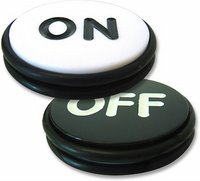 Of course, the indecency movement will plead its case, too. But maybe...just maybe...media companies have re-found the will to take a stand for free speech, for common sense and a reminder that radio listeners and TV viewers always have the real control. It's the public that controls the on/off button, it's the public that decides what programs to watch or listen to, and it's the public that decides what is too "offensive" or "indecent" simply by voting in the ratings system or by supporting the advertising spent for the programming. In media, ratings (or subscribers) still matter most to drive revenues.
Of course, the indecency movement will plead its case, too. But maybe...just maybe...media companies have re-found the will to take a stand for free speech, for common sense and a reminder that radio listeners and TV viewers always have the real control. It's the public that controls the on/off button, it's the public that decides what programs to watch or listen to, and it's the public that decides what is too "offensive" or "indecent" simply by voting in the ratings system or by supporting the advertising spent for the programming. In media, ratings (or subscribers) still matter most to drive revenues.
We don't need the government in our living rooms, our cars, our bedrooms. The goverment doesn't need to be our eyes or ears deciding what we should enjoy through media and entertainment. Instead, we need them to be our eyes and ears protecting us against threats, such as terrorism or economic security.
Good for CBS for being the first to take on the FCC; perhaps this is the first of many steps to reverse a shameful media trend.
posted by Unknown @ Friday, July 28, 2006,
,
![]()
![]()
Maybe the long tail isn't wagging the dog after all
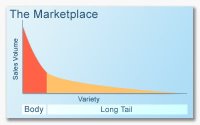 For the last 2 years, Wired magazine writer Chris Anderson's online theories regarding "The Long Tail" have gotten a lot of attention. It got the Wall Street Journal's attention yesterday, taking a bite out of the long tail supposedly wagging the internet's ecommerce dog. And onliners have taken notice.
For the last 2 years, Wired magazine writer Chris Anderson's online theories regarding "The Long Tail" have gotten a lot of attention. It got the Wall Street Journal's attention yesterday, taking a bite out of the long tail supposedly wagging the internet's ecommerce dog. And onliners have taken notice.
Essentially, the long tail refers to a relative handful of blogs or sites that have a dominant amount of links going into them (the power few), giving them more market share and stronger ability to generate sales, while stretching down "the long tail" of millions of other smaller blogs sites may have only a handful of links going into them (i.e. the rest of us), giving them less influence in the marketplace of products and ideas.
However, they can still possess power, as Anderson has explained in a series of speeches and blog posts since his original article and has further extended the concept with his new book "The Long Tail: Why the Future of Business is Selling Less of More".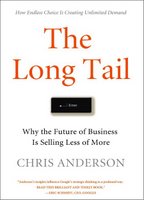 In the book, Anderson argues that products that are in low demand or have low sales volume can collectively make up a market share that rivals or exceeds the relatively few current bestsellers and blockbusters, if the store or distribution channel is large enough. In addition, he also talks about the downfall of the mass media concept of a "hit", amonth other subjects as they relate to the impact of the long tail.
In the book, Anderson argues that products that are in low demand or have low sales volume can collectively make up a market share that rivals or exceeds the relatively few current bestsellers and blockbusters, if the store or distribution channel is large enough. In addition, he also talks about the downfall of the mass media concept of a "hit", amonth other subjects as they relate to the impact of the long tail.
It seems to be among the most-talked-about books on internet commerce and marketing, giving a point-of-view showing how the Web is changing things. But yesterday Wall Street Journal columnist Lee Gomes disagreed with much of the tail argument, saying "it may be a long time before the long tail is wagging the web". This got the blogs a-talking.
In fact, Anderson write about the WSJ backlash here. Referencing the book, Anderson's argument is that traditional companies are limited by retail space -- only the "hot" items sell, so several thousand others, with a smaller demand, fall by the wayside. On the Web, companies like Amazon can carry a bigger inventory of slower-selling items. Anderson calls these "misses"; they make up the "long tail" of the title and add up to a big number. The new long tail idea is that this number could be even bigger than the combined sale of hot or "hit" items.
Referencing the book, Anderson's argument is that traditional companies are limited by retail space -- only the "hot" items sell, so several thousand others, with a smaller demand, fall by the wayside. On the Web, companies like Amazon can carry a bigger inventory of slower-selling items. Anderson calls these "misses"; they make up the "long tail" of the title and add up to a big number. The new long tail idea is that this number could be even bigger than the combined sale of hot or "hit" items.
One of his principles, the "98 Percent Rule," claims that no matter how much inventory you put online, somebody will buy it. That rule doesn't hold up when you consider online stores, WSJ's Gomes counters. Real Networks' music service shows that 22 percent of its music catalog receives a quarterly no-play rate; another 19 percent, just one or two plays. Nearly half of Rhapsody's available music is almost NEVER played! If you consider Amazon.com, the Web's largest retailer, 75 percent of its revenues come from only 2.7 percent of its titles. That's far more than the 25 percent that comes from its massive "long tail" inventory. So much for the long tail amounting to more than the combined sale of "hit" items.
If you consider Amazon.com, the Web's largest retailer, 75 percent of its revenues come from only 2.7 percent of its titles. That's far more than the 25 percent that comes from its massive "long tail" inventory. So much for the long tail amounting to more than the combined sale of "hit" items.
Adds Joint Communications' CEO John Parikhal:"Part of the Long Tail 'concept' is valid -- more choices are made available to more people over a longer period of time and "search" helps makes it possible.
The 'economics' of the Long Tail are ahead of their time (he's about 10-15 years ahead of some of the changes he predicts AND they will never account for the percent of revenue he thinks they will).
Most consumer goods are not really 'necessary' and therefore 'newness' will always account for a disproportionate share of many products. And, if something really breaks through and gets a big share of the pie, competitors will attack with improvements, limiting the demand and pricing the 'old' product (that was once 'new') can get on the long tail.
I think Chris Anderson is going to take a beating over this and it is going to hurt enthusiasm for the idea.
Having said all this, the idea of the Long Tail is an important way of thinking about distribution, inventory, niches and pricing."
Certainly puts new questions out there regarding how much the tail is waging the online dog players out there.
posted by Unknown @ Thursday, July 27, 2006,
,
![]()
![]()
Radio Was In The News This Week
 With the release of the important Spring ratings results from Arbitron, the state of the radio industry got an unusual amount of mainstream press this week.
With the release of the important Spring ratings results from Arbitron, the state of the radio industry got an unusual amount of mainstream press this week.
The difference between radio's two largest and most powerful radio groups couldn't have been more apparent than the news between CBS Radio and Clear Channel. A week ago, CBS Radio announced the "headcount reducing" of 115 people, including several legendary execs from the Infinity Broadcasting days. This was viewed on the radio message board forums as more body blows against the memory of the Infinity glory days -- before Howard Stern left, before the loss of heritage stations and people.
Meanwhile, Clear Channel received a positive tech profile from USA Today with the headlined article "CEO John Hogan may be hero to Clear Channel Radio". After years of often negative news and online forum commentary -- due to its massive and very rapid growth in all segments of media and the entertainment business as well as its stand on issues like Howard Stern, it looks like Clear Channel's brand perception is improving while CBS Radio's isn't.
While this was happening, the ratings were released, with Clear Channel increasing its group market shares in New York and Los Angeles while CBS Radio decreased its share. CBS Radio's three FM stations in New York -- WFNY (Free 92.3), WNEW (Mix 102.3) and WCBS (Jack 101.1) -- combined for only a 5.0 share of the market. Clear Channel, on the other hand, had 3 of the top 5 radio station in town. In fact, their overall #1 station WLTW (Lite 106.7) pulled in a 7.0 share by itself -- something three CBS FMs couldn't top or even challenge combined.
The lone good news for CBS: the return of the Opie and Anthony virus in mornings has given them much better results in just 2 short months; however, they are still having to clean up after the David Lee Roth morning show car wreck.
Over on the competing satellite radio front, receivers for both XM and Sirius have been viewed by the FCC as non-compliant as they cause bleed-over interference with standard broadcast radio frequencies. This forced both companies to pull the problem receivers from the market for correction. Since problems with the FCC need to be filed with the SEC, this has caused a drag on stock values for both companies. Meanwhile, XM continues to battle problems with the RIAA, claiming XM's newest recordable devices can record specific songs from XM programming, leading to royality issues.
Of course, not all news was good news for radio. Nielsen Analytics released a report stating 38% of active podcast downloaders (those who've downloaded podcasts in the last 30 days; about 6% of the study's participants described themselves this way, with 75% of them male) said they are listening less often to radio broadcasts.
If you're running a male-skewed format -- especially Rock or Alternative -- you better be podcasting or you'll definitely get left behind. Speaking of getting left behind, is radio leaving behind Madonna? For 20 years, she's been to be an automatic add for radio airplay. Her current world tour looks to be the highest grossing and most attended concert tour ever in the U.S. for a female artist, topping her own tour records. And yet radio is largely ignoring her newest pop dance album, now on its third single. Makes you wonder, if so many tickets are being sold and the album is selling (1.5 million copies sold, according to Nielsen Soundscan), why is Top 40 and Adult Contemporary radio so hung up on not playing her new songs?
Speaking of getting left behind, is radio leaving behind Madonna? For 20 years, she's been to be an automatic add for radio airplay. Her current world tour looks to be the highest grossing and most attended concert tour ever in the U.S. for a female artist, topping her own tour records. And yet radio is largely ignoring her newest pop dance album, now on its third single. Makes you wonder, if so many tickets are being sold and the album is selling (1.5 million copies sold, according to Nielsen Soundscan), why is Top 40 and Adult Contemporary radio so hung up on not playing her new songs?
posted by Unknown @ Saturday, July 22, 2006,
,
![]()
![]()
The Passion Of Bob Lefsetz: Advocating media change one letter at a time
 Bob Lefsetz has been on a rant for years.
Bob Lefsetz has been on a rant for years.
Fighting against the old ways and old thinking of the music business, he rails against the RIAA, jabs at the media kingdom content owners, and uppercuts the government elected reps and their in-pocket lobbyists trying to steal away more than a fair share for digital copyright royalties. He bodyslams the record labels, the concert venue promoters and the antiquated radio "stripminers" he sees devaluing the relationship between the music artists and their fans.
His weapon? For 20 years now, his Lefsetz Letter.
A popular industry speaker, he's the ultimate advocate for the fan because he's a super fan. A true digital age gadfly, unafraid of ruffling feathers or being politically correct. His language is coarse. And he often doesn't play nice. That's part of his charm. It's why his emailed newsletter is so popular among those in the music business. Readers may not always agree with his position or with the way he may attack an issue (or person). But they all love the fact he often says things no one else in the biz has the courage to say publically. Not to mention publish for all to see.
His language is coarse. And he often doesn't play nice. That's part of his charm. It's why his emailed newsletter is so popular among those in the music business. Readers may not always agree with his position or with the way he may attack an issue (or person). But they all love the fact he often says things no one else in the biz has the courage to say publically. Not to mention publish for all to see.
In the music business, he built up quite a following on the strength of his newsletter. His secret?
Passion.
Lack of fear.
All from a smart "insiders" point of view, as readers can see he's done his homework.
Wondering how to develop a successful "word of mouth" campaign to establish and support your brand? Are you feeling ground up in this post-consolidation media era and need a little reminder about how to get passionate and creative again?
A good start would be to read The Lefsetz Letter. And now he posts his letters on his blog archive. You might rediscover what it means to be a fan.
Today's topic? His Power Top Ten. His #1? Steve Jobs. Of course, Lefsetz explains exactly why you don't f*** with Steve Jobs.
posted by Unknown @ Friday, July 21, 2006,
,
![]()
![]()
The MySpace Just For Moms: UrbanBaby is where moms vent and share as a community
 One of the biggest media trends we're busy watching for the Jointblog is the continued rapid growth of social network communities.
One of the biggest media trends we're busy watching for the Jointblog is the continued rapid growth of social network communities.
Many media pundits say that "mass media is over" or that "the future is about small, not large, audiences". Both of those points may be true. Yes, Fortune 500 companies are still learning how to be successful online. However, that doesn't mean there aren't mass media successes built with large audiences.
MySpace -- less than 30 months old, earning 19% of all online advertising impressions and 40 million members (growing an estimated 100,000 new members a day). That certainly defines a mass media success. Even if it is controlled by its users, not by a media kingpin (which is the very point of its success). Despite being owned by News Corp., it's really owned and controlled by the consumer. And that is what it is all about in the new entertainment economy. The ultimate in search marketing: convenience, connection, content and control -- all made, contexted and found by the consumer. Successes like MySpace are the rarity, not the rule. Micro niche success targeting small (but rabid) audience fan bases are the norm for success. Just look at a site like UrbanBaby.com.
Successes like MySpace are the rarity, not the rule. Micro niche success targeting small (but rabid) audience fan bases are the norm for success. Just look at a site like UrbanBaby.com.
Starting as an experiment by the editors of Esquire magazine, UrbanBaby was created to provide an open forum for the modern metropolitan mom. A place to vent, to share, to kvetch, to trade secrets, and to brag. Or, often, to complain about their DH (dear husband). Some love being a "SAHM" (stay at home mom), some hate it. Sure, many of the other moms often say "BTDT" (been there, done that) or bitch about sex (not enough, dh wants it too much). But what really drives its success is its word-of-mouth addiction. It's viral, habit-forming, anonymous and often viewed as a god-send of relief for sleep-deprived, over-stressed and overwhelmend moms feeling alone and helpless.
Online message boards and forums are the major engine for any website trying to build a social community.
UrbanBaby certainly is a success story to watch and is profiled in this week's New York magazine ("Mothers Anonymous"). It's like a MySpace. Only it's for moms. Time magazine calls it one of their Top 50 websites. Yahoo's Internet Life has already put in their Hall of Fame. More kudos have come from InStyle, Wired, Time Out New York and many more. And yet, it is still just an underground, below radar success, designed purely to super-serve its core niche fan base. We suggest you check it out -- if you're a mom, thinking about being a mom, or wondering what will happen to your spouse/girlfriend after she becomes a mom. Or, if you need some inspiration building your own micro niche success. Or, if you're are simply looking for "Stacy's Mom", just like Rachel Hunter in the Fountains of Wayne video.
Or, if you're are simply looking for "Stacy's Mom", just like Rachel Hunter in the Fountains of Wayne video.
Hey, it is anonymous there...you never know.
posted by Unknown @ Thursday, July 20, 2006,
,
![]()
![]()
MySpace Has More Population Than the U.S. in 1900
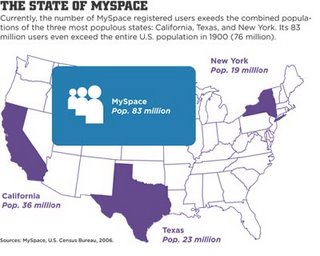
While YouTube is red hot with growth, it's still no MySpace. There are now more people signed up for MySpace than the entire population of the U.S. in 1900. Is MySpace an updated version of Teddy Roosevelt's "speak softly and carry a big stick"? It sure has one big stick(y) site. Only, MySpace's presence sure is LOUD. Today, it's community of excessive noise is larger than the 3 most populous states in in the U.S. right now -- New York, California and Texas (courtesy of PC magazine, MySpace and the U.S. census). It's the new digital "bully pulpit".
12 million hits every day, nearly 30 page views per visit, a 76% market share of social networking sites (according to Hitwise)..., and, in June, 17% of all online ad impressions. And still growing.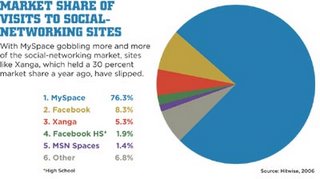 It's no wonder Rupert Murdoch saw the potential economic power of MySpace. Just wait until he turns those one-thousandth of a penny impressions into dollar impressions.
It's no wonder Rupert Murdoch saw the potential economic power of MySpace. Just wait until he turns those one-thousandth of a penny impressions into dollar impressions.
PC magazine here
posted by Unknown @ Tuesday, July 18, 2006,
,
![]()
![]()
The Place for Water Cooler Buzz: YouTube hits 100 million video views per day
 A new video clip culture is forming and YouTube is the place for it. It's a place where everyone can be Darth Vader...and get seen doing it by anyone.
A new video clip culture is forming and YouTube is the place for it. It's a place where everyone can be Darth Vader...and get seen doing it by anyone.
Dancing ninjas, girls fighting, cubicle life, college pranks...it's the modern version of America's Funniest Home Videos. Only its not on TV, it's found online -- the "new TV". 
All that is missing is Bob Saget (Tom Bergeron? hmmm, not as good).
SNL may broadcast spoofs of its comics as lettuce-biting hip hoppers or have Natalie Portman hip hop cursing up a storm for some bling...but they didn't become a water cooler hit until posted on YouTube.
As reported, "Internet video site YouTube just announced its users are now downloading more than 100 million videos per day." It's one of the fastest Internet successes ever. It's gotten the attention of the world's leading portals like Google, Yahoo!, MSN and AOL. And it's one of the biggest media trend shifts of the last decade: the transition of "water cooler" buzz from TV and radio to the Internet. If you want online water cooler buzz right now, YouTube is the place to grab some viral video.
It's one of the fastest Internet successes ever. It's gotten the attention of the world's leading portals like Google, Yahoo!, MSN and AOL. And it's one of the biggest media trend shifts of the last decade: the transition of "water cooler" buzz from TV and radio to the Internet. If you want online water cooler buzz right now, YouTube is the place to grab some viral video.
According to online traffic monitor Hitwise, YouTube is now the leading net video download site in the US, with 29% of the country's multimedia market.
29%!
The site specializes in short, home-made, comic videos but a growing number of pirated clips from mainstream broadcasters can be found also.
2.5 billion videos were watched on YouTube in June, the company said. Its videos account for 60% of all videos watched online in the US. In less than a year, YouTube attracts 20 million visitors to the site each month, according to Nielsen/NetRatings.
Still, all is not completely well with YouTube...being popular can make you a target.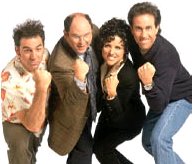 Regardless, it's where you find wacky stuff to pass along to your friends and colleagues. It's the place that inspires you to say "Hey, did ya see..." to start a conversation. That's something that used to be said after an episode from Seinfeld on TV. There's even people doing their best Seinfeld audition imitiations. Art imitating art imitating art.
Regardless, it's where you find wacky stuff to pass along to your friends and colleagues. It's the place that inspires you to say "Hey, did ya see..." to start a conversation. That's something that used to be said after an episode from Seinfeld on TV. There's even people doing their best Seinfeld audition imitiations. Art imitating art imitating art.
Yes, you still get some next morning water cooler talk from shows like American Idol...but YouTube's content is actually hotter because it is more viral. The content just spreads and spreads as it gets passed along. How else to explain a bad David Hasselhoff music video getting more than a million hits in just three weeks? It's not for "America's Got Talent".
YouTube is the place for water cooler buzz...placing Yahoo, Microsoft's MSN, Google and AOL clearly behind. They each have only 3 to 5% of the video search market (MySpace, meanwhile, has 19%).
By the way, here's how YouTube and MySpace Video compare in video page views and usage.
posted by Unknown @ Tuesday, July 18, 2006,
,
![]()
![]()
More pirate sightings -- this time on Stephen Colbert, thanks to iTunes
As noted earlier this week, pirates are everywhere. It's become quite the fashionable media trend. Why, even Jointblog fav Stephen Colbert got in the act during Jon Stewart's regular end-of-show handoff exchange on The Daily Show Thursday night. Truly hilarious bit.
Here's a link to a YouTube posting of the video clip.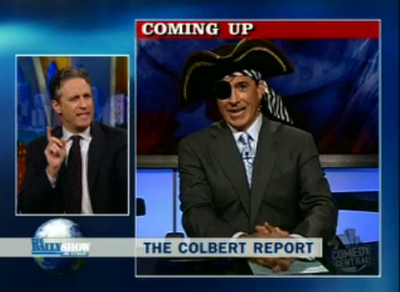
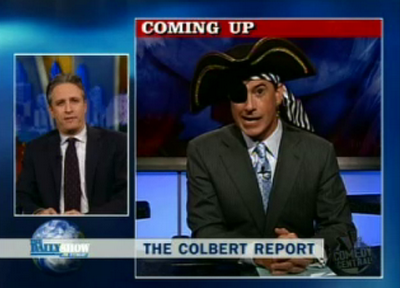

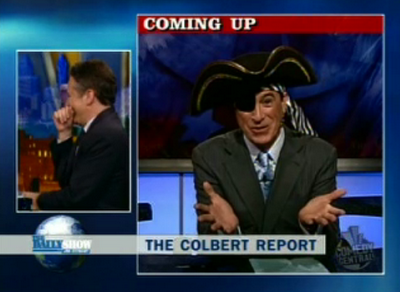
After not finding an image of the quick clip anywhere through search or places like YouTube, I just downloaded the show from Apple's iTunes and grabbed the pics (which quickly got requested on multiple blogs)...showing that the idea of making TV shows available through iTunes works.
A mighty truthy pirate, that Colbert is, indeed!
Arghhh! Mr. Colbert, I suggest you work on your relations with your wife...no room for just truthiness there. She needs the real deal. And that's the word.
posted by Unknown @ Saturday, July 15, 2006,
,
![]()
![]()
What's Next in Cool? Probably Found Somewhere Deep Within MySpace
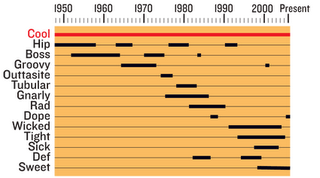
Cool is simply...cool. It's "it". You either have "it" or you don't. Being deemed cool is the ultimate compliment because it is desired. Wanted. Emulated. Copied.
This digital media age makes keeping up with cool really hard. Cool is not just a mass media media annointment. What makes something cool to one person or group -- by definition -- has to be deemed "uncool" by another person or group. When "cool" became a life pursuit in America with the baby boomers after WWII, many icons became commonly accepted as cool. Presley. Dean in his red leather jacket. Beatniks. Surfers. And on. Teens thought them cool; grownups didn't.
Cool as a word hasn't ever gone out of style. Lots of fad words have tried and failed to last (see graphic from Fast Company above). Being cool is powerful (although the movie "Be Cool" wasn't). The thinking is same today. Let's look at MySpace. Cool for 40 million members, creating 80 million webpages...and still awesomely growing. Uncool for people actually trying to search for subjects or members, due to their poor search engine tool. Cool for teens and twentysomethings trying to hook up or for indie bands and even major motion pictures to connect with fans. Uncool for people concerned with predators or "older" web users wanting social connections but disturbed by the "noise" and raw confusion. Cool for leading edge ad campaigns but uncool for advertisers concerned their campaign will get lost in the murk. The fact that MySpace was bought a year ago for $580 million after only 18 months of existence: cool. Many said, however, it was uncool that megamedia giant News Corp bought it, that it would have be "cooler" if Viacom's MTV Network bought it instead.
The thinking is same today. Let's look at MySpace. Cool for 40 million members, creating 80 million webpages...and still awesomely growing. Uncool for people actually trying to search for subjects or members, due to their poor search engine tool. Cool for teens and twentysomethings trying to hook up or for indie bands and even major motion pictures to connect with fans. Uncool for people concerned with predators or "older" web users wanting social connections but disturbed by the "noise" and raw confusion. Cool for leading edge ad campaigns but uncool for advertisers concerned their campaign will get lost in the murk. The fact that MySpace was bought a year ago for $580 million after only 18 months of existence: cool. Many said, however, it was uncool that megamedia giant News Corp bought it, that it would have be "cooler" if Viacom's MTV Network bought it instead.
So what has News Corp done with MySpace since they bought it? Inserted live "hotline" for users to alert editors of questionable content or possible predator activity. Tested micro advertising webpage campaigns offering free episodes of News Corp/Fox content (like "24"). Spent $20 million more on server infrastructure and distribution pipe. They even kept the creators of MySpace for its executive leadership instead of the typical M&A move of tossing the acquired's management. And decided not (yet) to insert banner or paid link advertising. The basically let their big purchase pretty much as it was before, with a few improvements for efficiency. What was the result, a year later? Doubled its user base and became (in May) the most popular website in the world (according to web traffic measurement by Hitwise). Meanwhile, News Corp chief Rupert Murdoch is coverboy for this month's The Wired 40.
What was the result, a year later? Doubled its user base and became (in May) the most popular website in the world (according to web traffic measurement by Hitwise). Meanwhile, News Corp chief Rupert Murdoch is coverboy for this month's The Wired 40.
That's cool.
So what's next for MySpace?
For more on cool, here's some links:
Fast Company article here (subscriber log-on required)
Malcom Gladwell archival article on "Cool Hunting" here
posted by Unknown @ Friday, July 14, 2006,
,
![]()
![]()
Fortune 500s Still Learning How To Be Effective Online
 Key advertising leaders believe in online media's future. Budgets are expanding, new strategies are being utilized (just look at the amount of different Crispin Porter + Bogusky-led websites and online movies for Burger King, including on MySpace and YouTube). Words such as "recall" to describe campaigns have been replaced by "cross platform impressions".
Key advertising leaders believe in online media's future. Budgets are expanding, new strategies are being utilized (just look at the amount of different Crispin Porter + Bogusky-led websites and online movies for Burger King, including on MySpace and YouTube). Words such as "recall" to describe campaigns have been replaced by "cross platform impressions".
Yet, the same advertising leaders across the nation question the ability of Fortune 500 companies to use digital media effectively. Last month at the annual conference for the American Advertising Federation, the AAF released their survey of "Industry Leaders on Digital Media Trends". It revealed that while there is strong belief digital marketing campaigns can be effective, there is lesser confidence Fortune 500 companies are capable to make them successful online. Two-thirds (63%) believe that Fortune 500 companies are "generally behind the curve when it comes to online ad strategy."
Last month at the annual conference for the American Advertising Federation, the AAF released their survey of "Industry Leaders on Digital Media Trends". It revealed that while there is strong belief digital marketing campaigns can be effective, there is lesser confidence Fortune 500 companies are capable to make them successful online. Two-thirds (63%) believe that Fortune 500 companies are "generally behind the curve when it comes to online ad strategy."
Despite all the excitement about viral video marketing this year, ad execs say online video campaigns are still not making a significant impact to TV ad budgets and plans. However, they forecast that average spending on online advertising, as a percentage of the total media budget, is anticipated to increase from 15 percent in 2005 to 20 percent in 2006, and expected to reach 32 percent by 2010...one-third of ad budgets. Whoa, that's big.
If you're looking for peer reviewed online ad campaigns over the last year to study for successes, they recommend (in order): 1) Burger King; 2) Apple and Verizon (tie); 4) Volkswagen and 5) Axe.
I agree. A couple of years ago, who'd have thought a fast food burger chain would be a buzz topic with hundreds of thousands of blog posts, as Burger King has just launched their umpteenth website after CoqRoq, The Whopperettes, Angus Diet, Subservient Chicken, Meat Stackers and HuckinChicken.
A full executive summary of the survey results is available here
posted by Unknown @ Thursday, July 13, 2006,
,
![]()
![]()
Pirates are everywhere -- in the theatre, in stores...and still on campus with student downloading
 Pirates are hot right now. $132 million at the opening weekend box office for the new Johnny Depp movie. Walk into any Borders book store and you'll see an entire section of Pirates of the Caribbean stuff, including PofC Monopoly and many more Pirates-related things. Amazon, too. Even last night's baseball All-Star games was held in the Pittsburgh Pirates home stadium. There are entire lines of jewelry and fashion devoted to the pirate look.
Pirates are hot right now. $132 million at the opening weekend box office for the new Johnny Depp movie. Walk into any Borders book store and you'll see an entire section of Pirates of the Caribbean stuff, including PofC Monopoly and many more Pirates-related things. Amazon, too. Even last night's baseball All-Star games was held in the Pittsburgh Pirates home stadium. There are entire lines of jewelry and fashion devoted to the pirate look.
Pirates, pirates, pirates. Enough to make the RIAA, MPAA and other digital copyright execs pull their hair out!
So, if you pirate a pirate movie, are you really a pirate or are you just a fan? Last week, the Wall Street Journal wrote that free music download services for on campus college students -- designed to combat illegal downloading -- were being ignored. Campus administrators across the country at major universities just haven't been able to persuade many students to use such digital download services as Napster, Rhapsody, Ruckus and Cdigix. Why? Too many strings attached, too little control...and ultimately, no ownership.
Last week, the Wall Street Journal wrote that free music download services for on campus college students -- designed to combat illegal downloading -- were being ignored. Campus administrators across the country at major universities just haven't been able to persuade many students to use such digital download services as Napster, Rhapsody, Ruckus and Cdigix. Why? Too many strings attached, too little control...and ultimately, no ownership.
College students preferring illegal downloading over free legal downloads got Joint Communications' CEO John Parikhal thinking. Says John:
Wall Street article here (may require subscriber log-on) |||> I never thought I'd see the day when you couldn't give music away free.
|||> I never thought I'd see the day when you couldn't give music away free.
But the Wall Street Journal says that Napster is being tossed out of some college programs because students don't want their music - even if it's free.
The reason - they don't want to lose their music libraries when they graduate and they don't like all the restrictions on downloading.
And, even worse - these free songs won't play on iPods - even though 42% of all college students own an iPod!
Talk about a disconnect.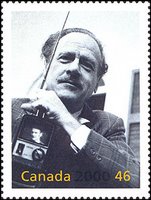 It didn't make sense to me until I remembered an old line from media guru, Marshall McLuhan.
It didn't make sense to me until I remembered an old line from media guru, Marshall McLuhan.
He once told me, "too many people navigate by looking in the rearview mirror".
What a concept - driving while looking backward. Yet, it explained why you can't even give music away for free.
The rear view mirror is the old business model. Business controlled the customer whenever possible.
The new model - where you can't give music away for free - is all about 3 things - giving the customer more convenience, more connection and more control.
Look at the winners right now.
iTunes gives convenience. MySpace gives connection. And Google gives control.
So this got me thinking ...
Some of the "old" media must be making the transition successfully.
Which ones are doing a good job on improving customer convenience, connection and control?
I'm interested in your thoughts. <|||
"The Rise and Fall of the Hit" from Wired.com here
Engadget posting here
posted by Unknown @ Wednesday, July 12, 2006,
,
![]()
![]()
Finally, Mancow is out of Q101
 Mancow is ManToast at Q101 in Chicago. Nothing personal...but his run is done. After an eight year run doing mornings, which led to Mancow building a network of syndicated stations for his show and fueled a long-running on-air fued with Howard Stern, Mancow's flagship has let him go.
Mancow is ManToast at Q101 in Chicago. Nothing personal...but his run is done. After an eight year run doing mornings, which led to Mancow building a network of syndicated stations for his show and fueled a long-running on-air fued with Howard Stern, Mancow's flagship has let him go.
Finally.
Yes, his show brought Q101 a version of "success"...but it cost the station far more than it earned. What used to be THE original "new rock alternative" station in America -- spawning dozens of copycats hoping to get a taste of Q101's strong ratings pre-Mancow -- is now just another starved Alt Rock station gone stale, a victim of misdirected strategy and an exhausting, lengthy competitive attack. What used to be a 4-to-5 share radio station is now mired with a 2 share or less...even lower when you take away Mancow's morning ratings.
Back in 1991 and 1992, Q101 was one of several has-been adult contemporary radios going nowhere. They had a million dollar morning show with Robert "Murphy in the Morning". And nothing else after his show. So they hired Joint Communications to help them figure out a new format direction -- one that would be compatible with their morning show (with its lengthy contract). Doing advanced market research, we identified Q101's opportunity and helped them create the strategy: an "AC" version of Modern Rock, which later was dubbed "New Rock Alternative". In Chicago, at the time, there was a sizeable audience of both women and men who liked to Rock and who'd listen to a new station if it played WXRT's gold Modern Rock along with the current Alt Rock sound still being shaped by bands like Nirvana, Pearl Jam and Stone Temple Pilots. What made Q101 unique at the time was that Q101 actually targeted women who loved New Rock Alternative; they knew the men would come anyway. They kept that strategy for 4 years, leading the way for breakthroughs from Smashing Pumpkins, Tori Amos, Alanis Morissette and Sheryl Crow...and anything grunge before grunge even had a name.
What made Q101 unique at the time was that Q101 actually targeted women who loved New Rock Alternative; they knew the men would come anyway. They kept that strategy for 4 years, leading the way for breakthroughs from Smashing Pumpkins, Tori Amos, Alanis Morissette and Sheryl Crow...and anything grunge before grunge even had a name.
Then, they made the decision to go male- instead of female-targeted. Against the core essence of the station strategy. This opened the way for estrogen success from new "Pop Alternative AC" Mix WTMX as Q101 went harder and more testosterone. Ratings for Q eroded, talent left or were fired, and a new competitor The Zone came in to further worsen Q101's ratings performance. Although Q ultimately outlasted The Zone, the damage was done -- Q101 was a shell of its former self.
That's the local effect. Nationally, Q101's move to a male-target may have been most responsible in killing the Alt Rock format on the radio. At the time, Q101 was the leader for the Alternative nation; its influence was strong. It reinvigorated KROQ in LA and inspired the launches of 99X in Atlanta, The Buzz in Houston, The Zone in Phoenix, The End in Seattle, dozens of "New Rock Alternatives" across the country, and even the format change of Howard Stern's flagship station in NYC on K-Rock from Classic Rock to Alt Rock. Q101 showed radio executives that money could be made. A lot of money.
Nationally, Q101's move to a male-target may have been most responsible in killing the Alt Rock format on the radio. At the time, Q101 was the leader for the Alternative nation; its influence was strong. It reinvigorated KROQ in LA and inspired the launches of 99X in Atlanta, The Buzz in Houston, The Zone in Phoenix, The End in Seattle, dozens of "New Rock Alternatives" across the country, and even the format change of Howard Stern's flagship station in NYC on K-Rock from Classic Rock to Alt Rock. Q101 showed radio executives that money could be made. A lot of money.
However, what the other stations (and the record labels) didn't realize was the importance of women New Rock Alt listeners within the success equation. And that it had a specific local design. Once Q101 gave that up design strategy and went male...bringing in more "edgy" Alt and Rap/Rock and finally reshaping the station into a Mancow-friendly station, the downslide of New Rock Alternative began.
Q101's move 10 years ago rippled throughout the industry, followed like lemmings by dozens of stations. Today, when you google "Q101 sucks", you get almost 10,000 links. All from this one local Chicago station.
Q101 used to be be an innovator. A pioneer for the format. A great station. Getting rid of Mancow is a good thing. Now the question is: can they return to their innovative roots and revive the New Alt Rock format again?
posted by Unknown @ Tuesday, July 11, 2006,
,
![]()
![]()
6 out of 10 of all online households now hook up through broadband

 The media trend of watching viral videos and the growth spike in household broadband usage go hand-in-hand. Without broadband, success stories like YouTube and Google Video -- as well as corporate startups like CBS's Innertube, Fox's MySpace, ABC's free hit series streaming site test and NBC's new forray with YouTube -- never would have happened. If it were still a dial-up world, who'd ever spend the slow time waiting to download watching Zidane's World Cup headbutt over and over in multiple languages? Or bother posting 3,278 different clips of girls fighting?
The media trend of watching viral videos and the growth spike in household broadband usage go hand-in-hand. Without broadband, success stories like YouTube and Google Video -- as well as corporate startups like CBS's Innertube, Fox's MySpace, ABC's free hit series streaming site test and NBC's new forray with YouTube -- never would have happened. If it were still a dial-up world, who'd ever spend the slow time waiting to download watching Zidane's World Cup headbutt over and over in multiple languages? Or bother posting 3,278 different clips of girls fighting?
It also means more opportunities to spoof David Hasselhoff, as noted below.
According to a new consumer research study shared by Mediapost's Center for Media Research , 69% of all US households now subscribe to an online service at home, and high-speed Internet services now account for about 60% of all online subscribers.
Some of the highlights from the national telephone survey (question: was VoIP used?):
* Cable remains the most common source for residential broadband driven by its strength among higher income households.
* 37% percent of all households with annual household incomes over $75,000 subscribe to cable broadband and 27% subscribe to DSL
* Among all households earning $30,000-$75,000 per year, 21% subscribe to DSL and 18% to cable
* 80% of all US households have at least one computer, but just 58% of those with annual household incomes under $30,000 have a computer at home
The study forecasts that by the end of the year 2010, there will be over 105 million residential online subscribers in the US, with over 80% subscribing to broadband. By the way, if you made it this far through the stats, you might like to check out the Hoff -- David Hasselhoff -- in a video spoof of his Knight Rider and Baywatch glory. Now that's why the Germans love him so much.
By the way, if you made it this far through the stats, you might like to check out the Hoff -- David Hasselhoff -- in a video spoof of his Knight Rider and Baywatch glory. Now that's why the Germans love him so much.
posted by Unknown @ Monday, July 10, 2006,
,
![]()
![]()
Save The Internet -- Keep It Net Neutral
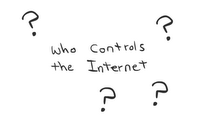 We're getting a big wake up call about the Internet. It might not be "free" much longer.
We're getting a big wake up call about the Internet. It might not be "free" much longer.
All because an issue called "net neutrality" refuses to die. How does this net neutrality stuff work? Here's a good primer.
The story is pretty simple ... we're becoming a broadband nation, addicted to crackberries and high speed connections. Which means we need cable, DSL and every other pipe we can lay our digital hands on.
This gives the cable and phone companies enormous power. They are still the primary high speed connection to the internet for most of us. And, they are trying to get Congress to make a law that could let them change their high speed to low speed if money doesn't change hands.
Here's why. Right now, the cable and DSL providers let us access all sites on-line at the same speed. It's just as quick to get to Amazon as it is to Rocketboom. If the telcoms get their way, that's going to change.
Right now, the cable and DSL providers let us access all sites on-line at the same speed. It's just as quick to get to Amazon as it is to Rocketboom. If the telcoms get their way, that's going to change.
Of course, cable thinks net neutrality efforts are attempts to neuter cable's growth.
For a Tale of the Tape comparing the pros and cons of net neutrality, click here.
Congress is pushing a law that would abandon the Internet's First Amendment -- a principle called Network Neutrality that prevents companies like AT&T, Verizon and Comcast from deciding which Web sites work best for you -- based on what site pays them the most.
They will be able to slow down your connection to iTunes and speed up your connection to eBay if they want to. And, it looks like they want to. Unless someone pays them.
Sound like Tony Soprano?
Here's how it might work. If a web site doesn't pay a fee (maybe 1/4 cent per person trying to reach their site), the high speed provider slows down the speed so that you, the user, get there slower. If they pay the fee, you get there faster.
In other words, the big and rich sites get faster connections (because they can pay) and smaller, poorer sites gets shunted to the slow lane. Goodbye to the "democratic" web.
So is Net Neutrality in Danger? There's a lot of campaign contributions being funneled to members of Congress and the Senate and it seems to be clouding their thinking. All of a sudden, they think it might be a good idea to let the cable and DSL providers do whatever they want to do.
There's a lot of campaign contributions being funneled to members of Congress and the Senate and it seems to be clouding their thinking. All of a sudden, they think it might be a good idea to let the cable and DSL providers do whatever they want to do.
They pull out the tired argument that the telcos have spent so much money building an infrastructure that they should be able to make even more profit from it (as if my $40 a month high speed bill isn't enough!).
I thought Net Neutrality was a slam dunk 6 months ago when it was a hot topic in Washington - because it makes sense to keep the Web "neutral". It seemed as if Congress agreed.
I guess I was wrong.
If you want to keep the Net "neutral", it's time to get involved. E-mail your Congressman or Senator that you support net neutrality. Educate yourself about the issue.
Last month, ZDnet posted an article discussing how the Senate continued negotiations over Net neutrality, saying "key senators who are planning to overhaul the nation's communications laws remain at odds on the controversial topic of Net neutrality." Net neutrality has emerged as one of the most contentious issues as Congress attempts to rewrite the nation's telecommunications laws.
After all, a great deal of the Internet's power is in the upstarts, weirdos, creative geniuses and bored kids who keep coming up with new ways to excite, entertain, educate and shock us - even if they don't make a penny doing it.
I think we should keep it that way. Do you?
-- John Parikhal
What does Tim Berners-Lee -- inventor of the World Wide Web -- say about Net Neutrality?
Net neutrality Vs. Net neutering, click here
How can you SaveTheInternet?
posted by John Parikhal @ Sunday, July 09, 2006,
,
![]()
![]()















